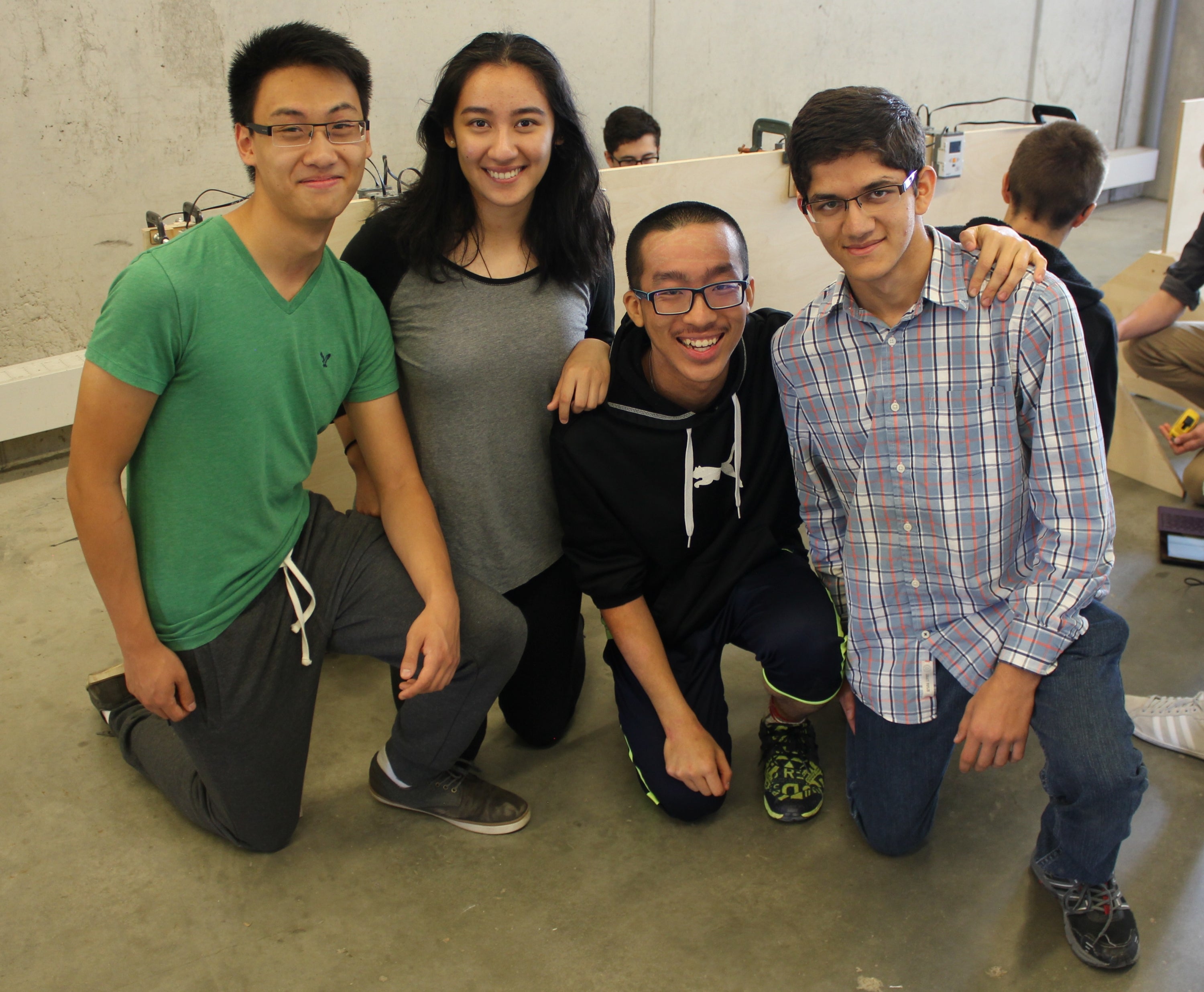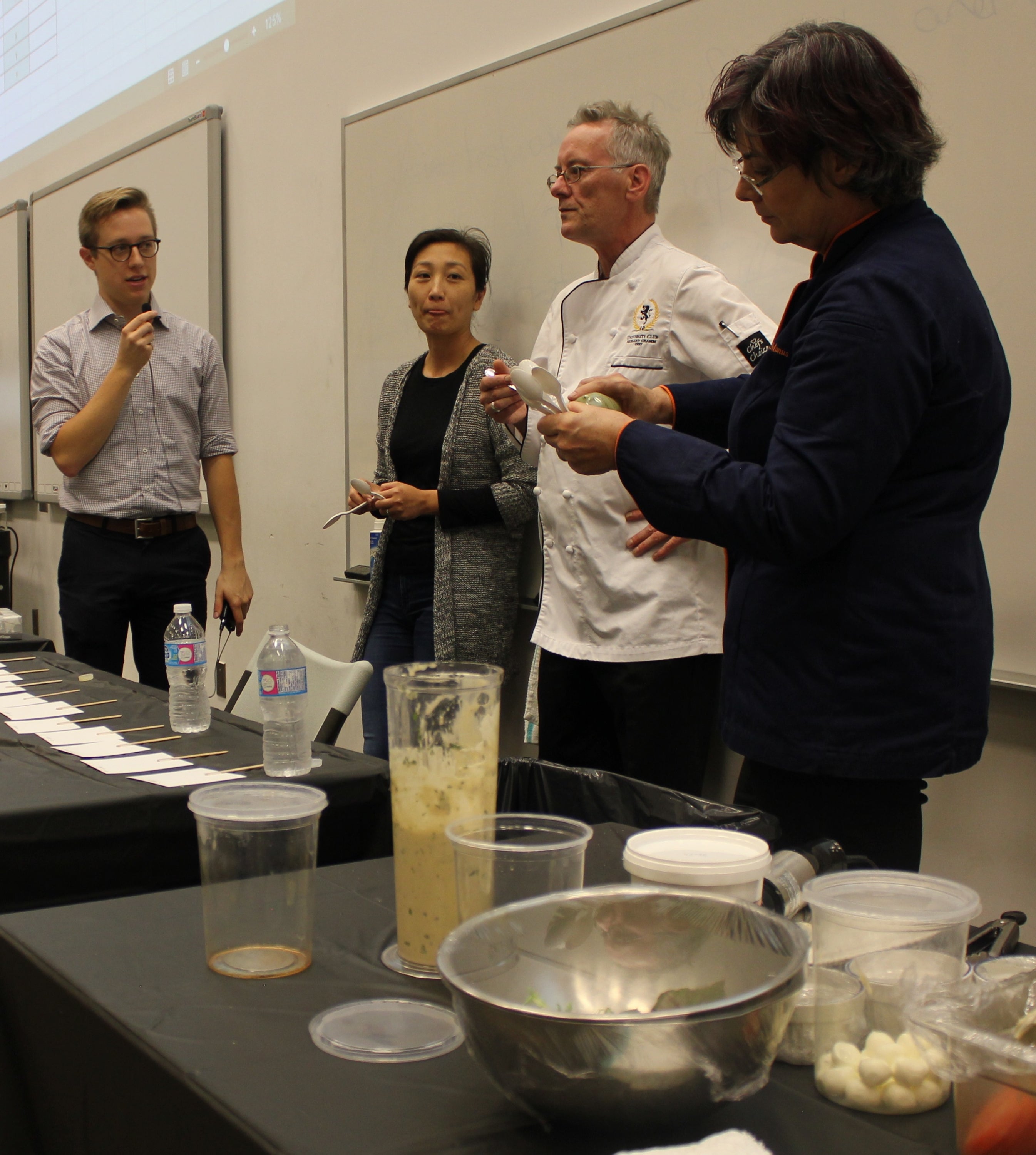Time was tight, but Team Pear made it under the wire as more than 200 first-year mechatronics engineering students got out of class to tackle hands-on problems recently.
Despite a math error that set them back two hours, members Eric Chee, Ken Jen Lee, Karan Bajaj and Mulan Ramani combined calculus, linear algebra, graphic design, computer programming and a little 3D modelling to make a plotter using a Lego controller.
“It works,” said Chee as a presentation loomed near the end of the two-day event at the Sedra Student Design Centre. “It’s not perfect, but it works.”

Team members Eric Chee (left to right), Mulan Ramani, Ken Jen Lee and Karan Bajaj collaborated on a plotter using a Lego controller at Tron Days.
Trial and error were just part of the drill as students collaborated on projects including the design of a solar grid to power Kitchener-Waterloo, making a two-axis robot and solving an algebra problem set in a zombie world.
So were thinking on your feet, learning on the fly and drawing on class lessons in the six subjects that comprise the curriculum in the first semester of mechatronics engineering.
Tron Days was one in a series of similar events developed by the Engineering Ideas Clinic to engage and encourage creativity among students in the very early stages of their academic careers.
'It has been exceptional'
Sanjeev Bedi, a mechanical and mechatronics engineering professor who is director of the centre, said organizers of the inaugural event were impressed with how ambitious and nimble students proved despite their limited grounding in academic basics.
“They’ve been solving things which we thought were totally beyond their capabilities,” he said. “It has been exceptional.”
Students welcomed the change of pace and the opportunity to take on real-world problems, applying what they’ve learned so far while also realizing that they have a long way to go yet.
“We’re just in our first year, so we still have a lot to learn,” said Lee, as they put the finishing touches on their plotter.
“In four years, we’ll be able to do this with ease,” added Chee.
Salad dressing and nanotechnology
The benefits of experiential learning were also on display a few buildings away as 115 first-year nanotechnology engineering students worked in teams to make salad dressings in the Great Vinaigrette Challenge, now in its third year.
Half the battle, decided by a panel of judges, was coming up with a recipe that tasted good. The other half, determined by testing in a centrifuge, was making a dressing as stable as possible using the principles of emulsification.
The judges included Richard Cramm, head chef at University of Waterloo food services, and Evelyn McManus, research and development corporate chef for M&M Food Market, who rated the entries by holding up emoji signs.

Teaching assistant Zac Young (left to right) and judges Shirley Tang, Richard Cramm and Evelyn McManus at the Great Vinaigrette Challenge for first-year students.
“It’s bad all around,” McManus weighed in at one point as they sampled dressings lined up in plastic water bottles during the light-hearted taste-off.
“Sorry,” said Kingsley Wong, the student picked to present his team’s unpleasant concoction.
“Don’t be sorry,” replied McManus, hitting on the underlying spirit of the event. “You’re learning.”
The top prize for stability went to Gurpreet Randhawa, Emma Atkinson, Zoobia Shahab, Olivia Friscioni and Xinyi Li.
The best-tasting dressing was created by Lucy Chen, Jadrian Abramovitch, Christian Crimi, Mayuri Sritharan and Alina Pavel.